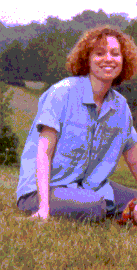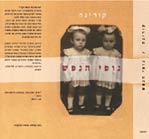 |
Corinna Hasofferett leads you astray |
 |
||
Index
In Translation:
|
CommentaryTuesday, May 04, 2004My Parents' First CruiseI got this in an e-mail from my dear friend Mary in USA: I would like to tell you about my parents' 1st cruise. It wasn't aboard your typical luxury liner that leaves from Miami for various Caribbean ports of call.  This ship had only one destination - and it wasn't Puerto Rico. It was - Palestine! This ship had only one destination - and it wasn't Puerto Rico. It was - Palestine!
It was the summer of 1946. The port city - Torrino, Italy. My parents were in their early 20's. Their experience was just a little bit different than the typical cruise line passengers' experience of departing in broad daylight and being greeted with smiling clip-board holding, shore side staff. Instead, they gathered in the hundreds in the middle of a moonless night. They were immediately met in hushed whispers by the highly efficient agents of the Hagannah's Mossad Aliyah Bet. Their cruise ship was a dilapidated fishing vessel whose captain protested at the sight of the huge number of passengers on shore. But no Jew was turned away, each one prepared and accounted for by the Brichah - the "Escape" underground network. The passengers had risked everything to get there, and no one was about to turn back. My parents had no time to relax as they boarded the ship renamed the S.S. Chuf Gimmel. There was no gangway with helpful baggage handlers to help them step on board. Instead my parents were hoisted silently into the black night onto rope ladders swinging wildly in the gusty winds. They desperately clung to the ladders as they climbed up the sides of the ship which rolled precariously from side to side. Somehow everyone managed to get on board and the ship finally set sail into the inky darkness. There were no cheers. No bon voyage parties. Only complete and utter silence as 800 Jewish refugees stood closely together unmoving for the first few hours of the night, aware of the extreme dangers ahead and overwhelmed by the enormity that they were finally on their way to Eretz Yisrael. Everyone was organized by groups - survivors from Auschwitz, former partisans, or in my parents' case - political parties such as DROR, a Socialist Zionist movement. My parents' accommodations were hardly spacious or luxurious. People slept wherever they could. During the day, my mother who was ill, stayed below deck to escape the scorching Mediterranean sun and to avoid detection from the British Air force. The claustrophobic overcrowded conditions in the bowels of the dank ship were not suitable for my adventurous father. He was quite macho and although he would never admit to being seasick was often found conveniently near a railing. During the day, whenever a plane flew above, he and any others aboard deck would flatten themselves against the deck or hide below. My parents' ship offered no buffet or seated dining. Instead, to compliment their parched palettes, their food rations couldn't be more sadistic - consisting of only salty dried salami, salty hard crackers (in which u needed a hammer to break them), and a canteen of 2 cups of water a day. My father was so thirsty he even tried ocean water - which earned him several more trips to the railing. The voyage was only supposed to last three or four days. But in the middle of their journey, disaster struck. Their motor died. Three days stretched to almost three weeks as the tiny fishing vessel bobbed alone in the vast, empty ocean. Conditions became desperate. They ship had only brought enough food and water to last a few days, so their portions were reduced to almost nothing. There were no means to bathe and the toilets were not functioning. Their leaders told them to be patient, but their grim faces revealed that the situation might be beyond their control. Suddenly, a British scouting helicopter spotted the ship, and soon, out of nowhere, three giant British destroyers surrounded their boat. Through bull horns, a naval officer commanded the Jews to surrender. But the bedraggled refuges of the tiny fishing vessel, facing the huge white battle ships of the Royal British Navy said - "nothing doing." After three more days, the British finally lost patience and troops climbed aboard. The exhausted, weak survivors, in defiance, threw over their few remaining crates of food they had left. They were now going on a hunger strike. With the British on board, a scuffle soon ensued as the refugees tried to fend off the troops. Suddenly, one of the Jewish leaders clutching an Israeli flag under his arm, boldly climbed the flag pole in an attempt to attach it to the pole. A British sailor tried to climb up after him, but the Jew kept kicking him down. In order to regain control of the chaotic situation, the British troops aimed their guns at the Zionist rebel and turned to their commanding officer for orders. 800 pairs of Jewish eyes also turned to the commander and everyone held their breath. And then, out of the crowd, a single voice began to sing Ha Tikvah. Soon all the refugees joined in and incredibly the commanding officer took off his hat and held it against his heart! His sailors placed their hats over the hearts as well! And then, as soon as the song ended, everyone started fighting all over again! The British soon tired of fighting with the refugees and returned to their ships and simply attached chains to my parents' boat and towed it behind them. After all these weeks adrift at sea, my parents felt like they were flying! They were towed directly into Haifa. On the shore, they could see Palestinian Jews rioting around fires on the beach shouting "Let the Jews go!" But the British had other plans. With high pressure water guns, they violently forced the refugees onto their prison ship. My Dad, ever the gentleman, somehow managed to go back to their empty boat to look for my mother's shoe that was lost in the fight. Much to his surprise, he found their daring group leader hiding below deck. "Zalmon," my Dad shouted. "What are u doing here!?" Zalmon responded, "I didn’t survive the war and land in Palestine only to be captured by the British! I will fight to the end!" My father thought quickly, catering to Zalmon's ego, and reasoned with him. "Zalmon," he begged. "What's another dead Jew to the British. Get back upstairs! Nu! The Jewish people need you!" Thanks to my Dad, Zalmon followed him up and is now a retired medical doctor from Hadassah Hospital. Anyway, my parents and Zalman and all 800 Jewish passengers were forced onto the British prison ship headed for Cyprus. My Dad would say to me, that the most depressing experience during the war was after the war - on that prison ship. For as they pulled out of Haifa, these survivors of the Holocaust once again looked through barbed wire, watching their hopes and dreams of the Promised Land fade as the fires on the beaches of Haifa grew smaller and smaller and their protestors' voices dissolve into thin air. Mary Brown, Florida, USA |


|
|||||||||
| This page and all its contents (except the interviews and reviews) are copyright
© Corinna Hasofferett 2002-2004 If you have a problem viewing any page at this site,please let us know by writing to us |
Maabarot Web Design-MWD |